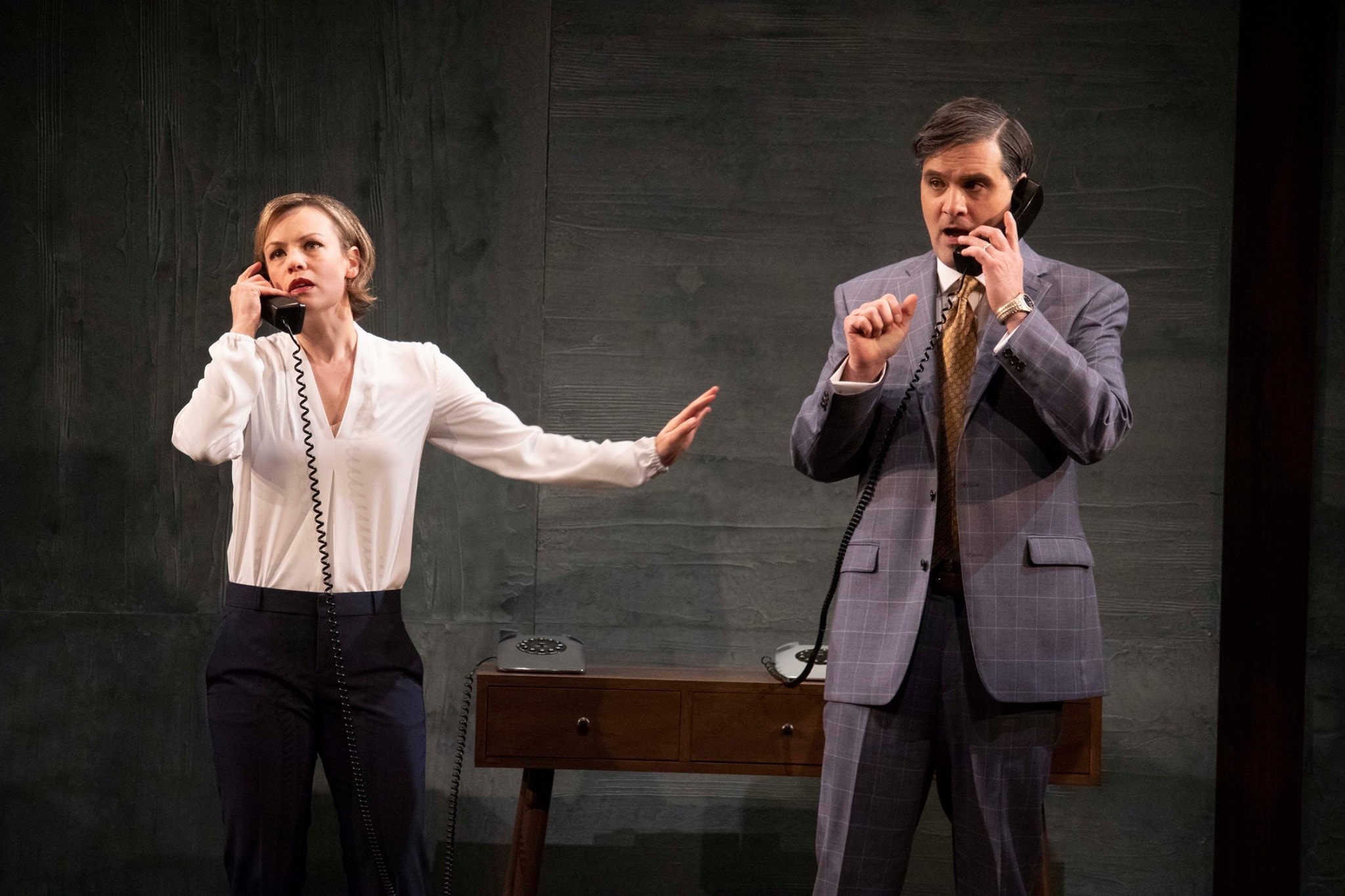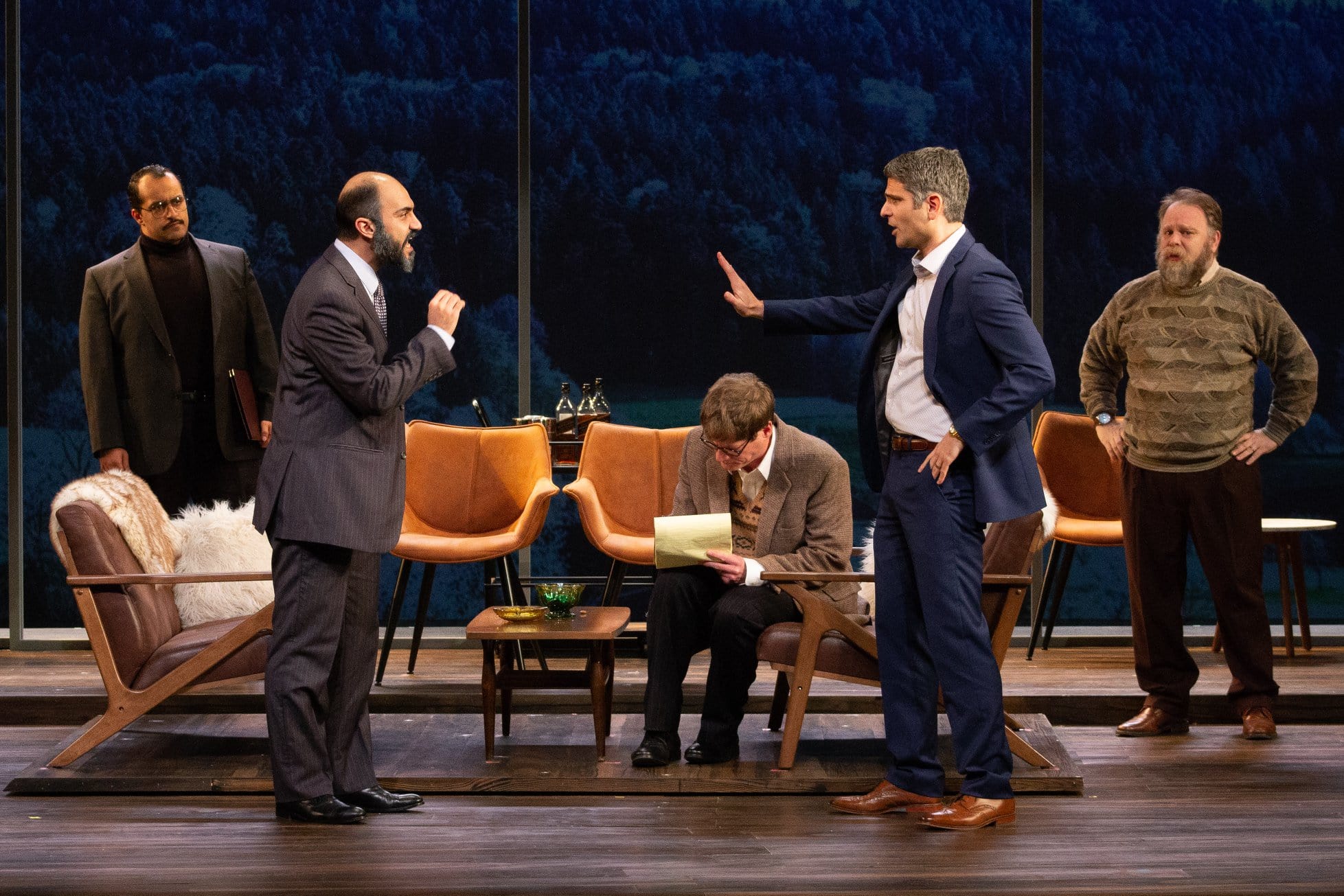For those wanting to be absorbed into a highly recommended, fictionalized account of events surrounding the 1993 Oslo Accords and the inconceivable peace between Israelis and Palestinians that bloomed for a short period of time, head downtown to DC’s Lansburgh Theatre. There, in the temporary home for Bethesda’s Round House Theatre, is an absorbing, highly watchable, prime-time production of playwright J.T. Rogers’ Oslo.

Whether an audience is personally or historically steeped in long-standing, serious, tense Middle East issues or less directly connected to intractable Middle East politics, Round House’s Oslo provides plenty to chew on.
Under the deft direction and fine ensemble casting by Ryan Rilette, Oslo is vivid. It is filled with bravado, secrets, whispers, and purposeful lies leavened with often raucous male humor. The production’s large cast of Scandinavian, Israeli, Palestinian, and American characters have vastly varied personalities and rigid principles to overcome that could have too easily been depicted as unbalanced cartoonish stereotypes. Rilette’s direction is not one of easy stereotypes. Rather, he and his formidable cast provide the audience with substance, not one-sided partisanship.
In playwright Rogers’ backstory account, the events leading to the Oslo Accords are led by an unknown husband-and-wife team of Norwegian free-thinkers, Terje Rød-Larson and Mona Juul, operating through back channels.
For the most part, the play is told through the Norwegians’ eyes. The two show and tell how they bring together an unlikely band of associates acting as unofficial envoys. Operating in secret, the goal is to negotiate a peace between Israelis and Palestinians–and without America finding out. Husband Terje, a long-winded academic with some comical tendencies, is winningly portrayed by Cody Nickell. Erin Weaver nails the character of Mona as a sincere and strategic implementer of her husband’s more academic concepts. Weaver is invariably a calming influence on the peace accord development. In character as Mona, Weaver also often smoothly breaks the Fourth Wall acting as a narrator between the audience and the cast of characters.
The Norwegian concept for the negotiations is what Terje calls “gradualism.” It is “his” model, so he thinks. The idea is to take small steps forward to a modicum of peace, rather than an all or nothing approach. Gradualism is thought to be a way to break down personal animosity. It is rooted in the small and intimate and personal, not the large, cold and bureaucratic. It is a way to show that the other side, one’s enemy, is not just composed of dogmatic villains. Seeing just one side of another person does not mean one knows “all of him” as Terje says near the top of Oslo.
Through twists and turns, setbacks and small victories, Oslo idiosyncratically fills out how the Oslo Peace Accords may have happened. The awesome cast beyond Nickell and Weaver includes a number of very passionate characters. There is a marvelous, nuanced performance by Maboud Ebrahimzadeh as PLO Finance Minister Ahmed Qurie. He gives a layered voice and strong mannerisms to his character. Ahmad Kamal is a rock-solid Hassan Asfour, who has his own personal journey from ardent blustering Communist to something else again.

Israeli characters include Sasha Olinick as a rumpled unofficial envoy who finds himself kicked to the curb as negotiations become official. Conrad Feininger is a resonate Foreign Minister Shimon Peres and Juri Henley-Cohn is an intrepid, high-level negotiator named Uri Savir. Alexander Strain is Yossi Beilin, a fervent deputy foreign minister, and John Taylor Phillips as Joel Singer, an adamant lawyer who enters the fray late with plenty of detailed “how to” questions that must be responded to by the PLO representatives.
Then there is Kimberly Gilbert. She steals the production each time she appears as a cook adored by all sides for her marvelous homemade waffles. Her line delivery is one to study for how to show meaning with voice inflections and simple body gestures.
By the end of Oslo, I felt I had come to know the characters. They took on singular personalities beyond blustering firebrands and as they argued and remained at odds over issues both huge and more intimate. And over the course of the production, they grew to trust one another. Each also came to appreciate that “what is a lie but a dream that could come true?”
The production is blessed with a fine creative design team. Misha Kachman (set), Ivania Stack (costumes), Jesse Belsky (lighting), Matthew M. Nielson (sound and composer), and Jared Mezzocchi (projections) provide an overall look of movement to what could have been a rather stagnant, drawing room drama. Together they bring a well-developed sense of what happens behind a closed door and what happens in front of the same door.
For those wanting to ponder a fictionalized, mostly even-handed account of a major world event, Oslo is a production to take in, and then debate – not with friends of the same point of view, but those who may hold a vastly different view of the Middle East. It is certainly a production for those who have mourned the loss of the short-lived, inconceivable peace between Israelis and Palestinians. It is also terrific theatrical entertainment.
Think of Oslo as a precursor to The Band’s Visit – another take on peace in the Middle East. What a double bill that would be.
Running Time: Approximately two hours and 55 minutes, including one intermission.
Oslo, presented by Round House Theatre, plays through May 19, 2019, at the Lansburgh Theatre, 450 7th Street NW, Washington DC. For tickets, call the box office at (240) 644-1100 or go online.
Note: Oslo won Tony, New York Critics, Outer Critics, Drama Desk, Drama League, Lortel, and Obie awards.
Additional Credits:
John Austin, Trond, German Husband; Susannah Morgan Eig, German Wife/Swedish Hostess; Michael Sweeney Hammond, American Diplomat/Thor Bjornevog; Todd Scofield, Johan Jorgen Hoist/Finn Grandal; Gregory Wooddell, Jan Egeland/Ron Pundak
Kasey Hendricks, Props Master; Dawn-Elin Fraser, Dialect Coach; Gabrielle Hoyt, Dramaturg; Che Wernsman, Resident Stage Manager
RELATED COLUMN:




